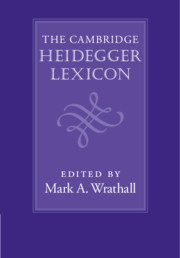Book contents
- The Cambridge Heidegger Lexicon
- Series page
- The Cambridge Heidegger Lexicon
- Copyright page
- Contents
- Contributors
- Preface
- Acknowledgments
- Using the Lexicon
- Chronology of Martin Heidegger
- Abbreviations for Heidegger’s Works
- A
- B
- C
- D
- E
- F
- G
- H
- I
- J
- K
- L
- M
- N
- O
- P
- R
- S
- T
- 197. Technology (Technik)
- 198. Temporality (Temporalität,Zeitlichkeit)
- 199. Thematic (thematisch)
- 200. There (Da)
- 201. Thing (Ding)
- 202. Thinking (Denken)
- 203. Thrownness (Geworfenheit)
- 204. Time (Zeit)
- 205. Topology (Topologie)
- 206. Transcendence (Transzendenz)
- 207 Transition (Übergang)
- 208. Translation (Übersetzung)
- 209. Transparency (Durchsichtigkeit)
- 210. Truth (Wahrheit)
- 211. Turn (Kehre)
- U
- V
- W
- German–English Glossary
- Bibliography
- Index
208. - Translation (Übersetzung)
from T
Published online by Cambridge University Press: 17 April 2021
- The Cambridge Heidegger Lexicon
- Series page
- The Cambridge Heidegger Lexicon
- Copyright page
- Contents
- Contributors
- Preface
- Acknowledgments
- Using the Lexicon
- Chronology of Martin Heidegger
- Abbreviations for Heidegger’s Works
- A
- B
- C
- D
- E
- F
- G
- H
- I
- J
- K
- L
- M
- N
- O
- P
- R
- S
- T
- 197. Technology (Technik)
- 198. Temporality (Temporalität,Zeitlichkeit)
- 199. Thematic (thematisch)
- 200. There (Da)
- 201. Thing (Ding)
- 202. Thinking (Denken)
- 203. Thrownness (Geworfenheit)
- 204. Time (Zeit)
- 205. Topology (Topologie)
- 206. Transcendence (Transzendenz)
- 207 Transition (Übergang)
- 208. Translation (Übersetzung)
- 209. Transparency (Durchsichtigkeit)
- 210. Truth (Wahrheit)
- 211. Turn (Kehre)
- U
- V
- W
- German–English Glossary
- Bibliography
- Index
Summary
Translation is a being transposed into an encounter with what is foreign about a foreign language in rendering a linguistic text or utterance into one’s native language so that it can be expressed in another language. But Heidegger thinks of linguistic translation as involving a transformed relation to what is foreign within one’s own native language and condition by way of this encounter. Although Heidegger does not offer a “translation theory” in the same manner that he does not offer an “aesthetics,” beginning in the mid-1930s he becomes increasingly concerned with the question of translation, especially as it pertains to the “spiritual” affinity he understands to prevail between the Greek and German languages.
- Type
- Chapter
- Information
- The Cambridge Heidegger Lexicon , pp. 772 - 773Publisher: Cambridge University PressPrint publication year: 2021

